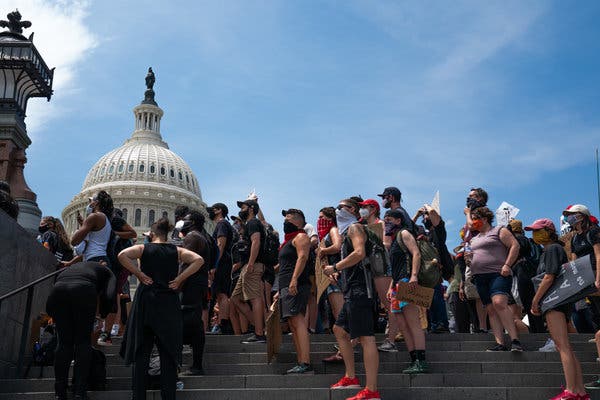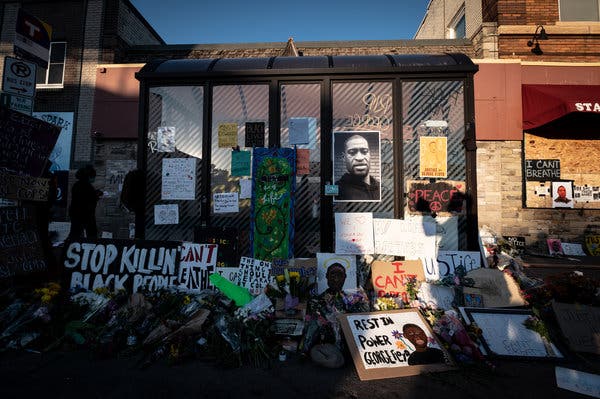Advertisement
Elements of the package, to be unveiled on Monday by House and Senate Democrats, are certain to meet with opposition from police unions and their allies.

Democrats in Congress plan to unveil expansive legislation on Monday that would make it easier to prosecute police misconduct and recover damages from officers found to have violated the constitutional rights of civilians, and step up pressure on the Justice Department to address systemic racial discrimination by law enforcement.
The bill, which House and Senate Democrats have named the Justice in Policing Act of 2020, is a direct response to the recent killings of three black Americans by white civilians and officers that have prompted protests across the country, but it includes policies that civil rights activists have been pushing for decades to combat racial bias and excessive use of force by law enforcement. The New York Times obtained a copy of a section-by-section summary of its contents, circulated privately on Capitol Hill late Friday.
It would be the most aggressive intervention into policing by Congress in recent memory, and elements of it are certain to meet with staunch opposition from politically powerful police unions and other law enforcement groups that have fought against such efforts in the past. It is not clear whether President Trump, who often aligns himself with law enforcement and has advocated the use of brutal police tactics, will embrace such measures now.
As currently proposed, it would significantly change federal law and require states and localities to make modifications of their own, such as instituting mandatory bias training, to receive federal funds. It would create a national registry to track police misconduct and require that law enforcement agencies report data on the use of force, as well as ban certain chokeholds and other practices that were used in confrontations with the police that left black Americans dead.
“Persistent, unchecked bias in policing and a history of lack of accountability is wreaking havoc on the black community,” House and Senate Democrats who assembled the package wrote in an email to colleagues on Friday accompanying the summary. “Cities are literally on fire with the pain and anguish wrought by the violence visited upon black and brown bodies.”
The effort is being led by Representative Karen Bass of California, the chairwoman of the Congressional Black Caucus, Representative Jerrold Nadler of New York, the House Judiciary Committee chairman, and Senators Cory Booker of New Jersey and Kamala Harris of California, the only two black Democrats in the Senate. They cited the deaths of George Floyd in Minnesota and Breonna Taylor in Kentucky that have inspired protests across the country, as well as other well-known victims of such force in recent years.

“While there is no single policy prescription that will erase the decades of systemic racism and excessive policing — it’s time we create structural change with meaningful reforms,” the lawmakers wrote.
The text of the bill was still being drafted on Saturday and could change before Monday’s unveiling, as could the legislation’s title.
Individual lawmakers in both parties have introduced their own proposals in recent days that the House and Senate could still consider going forward, but the bill by Ms. Bass and the others has the imprimatur of Democratic leadership in the House and Senate, as well as the influential black caucus. Democrats believe they will be able to swiftly pass it in the House, but prospects are less clear in the Senate, where the Republican majority is likely to pursue a narrower set of changes.
Because most police departments are under state and local control, there are limits to the kinds of changes Congress can mandate from Washington. Calls from activists to break up or drastically restructure police departments, for instance, are more likely to be answered at the state and local level.
Still, the changes Democrats are proposing would be significant.
If adopted, the bill would rewrite key elements of the federal criminal code related to police misconduct to make it easier to prosecute law enforcement officers and for individuals who are victims of such practices to recover damages.
The federal police misconduct statute currently makes it a crime for an officer to “willfully” violate an individuals’s constitutional rights, meaning prosecutors must prove an officer acted with the intention of depriving the person of their rights. Democrats plan to propose lowering that standard of criminal intent to “knowingly or with reckless disregard.” The change is likely to face opposition from police unions and their allies.
The legislation would also alter the legal doctrine known as qualified immunity that shields police officers from being held legally liable for damages sought by citizens whose constitutional rights were violated.
In addition, Democrats are proposing to change the federal standard for the use of force by officers from “reasonableness” to only when it is “necessary to prevent death or serious bodily injury.” The bill would require that federal officers use de-escalation tactics and use deadly force only as a last resort. Grants to state and local agencies would require them to do the same.
In federal drug cases, lawmakers intend to propose banning “no knock” warrants, which allow police to enter a residence without warning or identifying themselves, and incentivize states to do the same. Ms. Taylor was shot and killed in her home during such a raid.
The legislation would also ban chokeholds or other carotid holds, and condition law enforcement funds on states and other agencies doing the same. The technique led to Mr. Floyd’s death, prosecutors have said, and the high-profile death in 2014 of Eric Garner in New York.
It would also limit the transfer of military weaponry to state and local departments.
It would give new power to Justice Department investigators conducting inquiries into patterns or practices of behavior by police departments that violate the Constitution and incentivize state attorneys general to conduct such investigations on their own.
Lawmakers would require all uniformed federal officers to wear body cameras and use dashboard cameras, which have been crucial tools to holding officers accountable in many cases, and they would mandate that state and local agencies use federal funds to “ensure” their use.
Democrats would also try to prod state and local law enforcement agencies to undertake a new effort to end discrimination in their practices, by conditioning federal funding on the adoption of policies and training to combat racial and other discriminatory profiling.
The bill would also impose new requirements on the Justice Department to assemble and promulgate new policing standards for state and local agencies and collect reams of data on police actions all over the country that could inform more changes in the future, particularly when a Democratic administration controls the department.
The bill would also include a provision, held up in the Senate, that would make lynching a new federal hate crime for the first time in American history.



